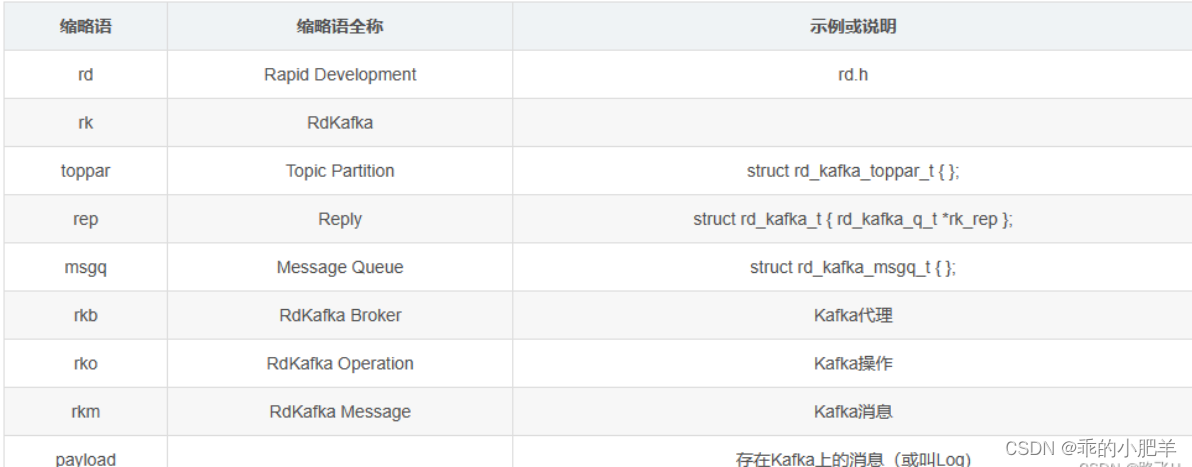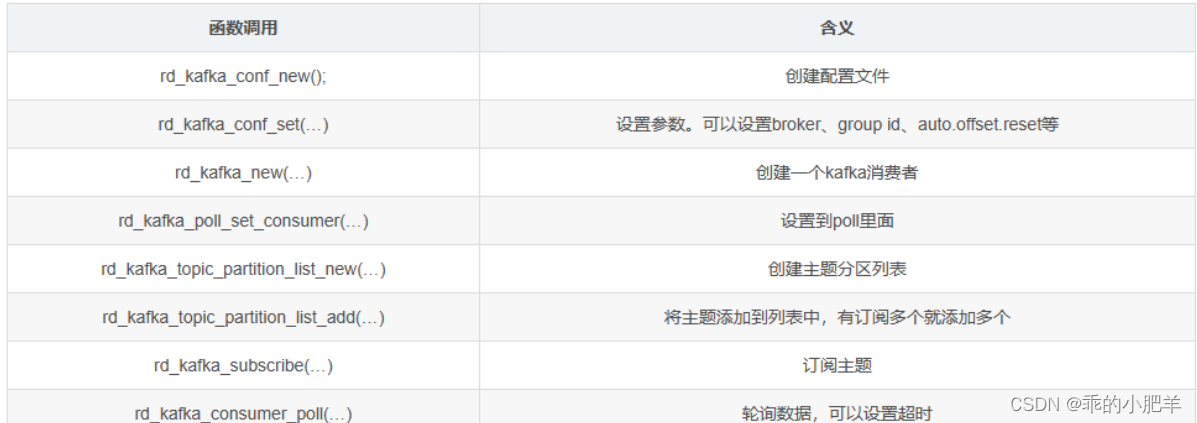1 安裝librdkafka
git clone https://github.com/edenhill/librdkafka.git
cd librdkafka
git checkout v1.7.0
./configure
make
sudo make install
sudo ldconfig
?
?在librdkafka的examples目錄下會有示例程序。比如consumer的啟動需要下列參數
./consumer <broker> <group.id> <topic1> <topic2>..
?指定broker、group id、topic(可以訂閱多個)。示例:
指定broker、group id、topic(可以訂閱多個)。示例:縮略語介紹:
?

2 開啟kafka相關服務
2.1 啟動zookeeper
啟動zookeeper可以通過下面的腳本來啟動zookeeper服務,當然,也可以自己獨立搭建zookeeper的集群來實現。這里我們直接使用kafka自帶的zookeeper。
?
cd bin/
# 前臺運行:
sh zookeeper-server-start.sh ../config/zookeeper.properties# 后臺運行:
sh zookeeper-server-start.sh -daemon ../config/zookeeper.properties
?可以通過命令lsof -i:2181 查看zookeeper是否啟動成功。
$ lsof -i:2181
COMMAND PID USER FD TYPE DEVICE SIZE/OFF NODE NAME
java 74930 fly 96u IPv6 734467 0t0 TCP *:2181 (LISTEN)
2.2 啟動Kafka
啟動kafka(kafka安裝路徑的bin目錄下執行),默認啟動端口9092。
sh kafka-server-start.sh -daemon ../config/server.properties
2.3 創建topic
sh kafka-topics.sh --create --zookeeper localhost:2181 --replication-factor 1 --partitions 1 --topic test
參數說明:
–create 是創建主題的的動作指令。
–zookeeper 指定kafka所連接的zookeeper服務地址。
–replicator-factor 指定了副本因子(即副本數量); 表示該topic需要在不同的broker中保存幾份,這里設置成1,表示在兩個broker中保存兩份Partitions分區數。
–partitions 指定分區個數;多通道,類似車道。
–topic 指定所要創建主題的名稱,比如test。
?
3 c語言操作kafka的范例
3.1 消費者
在librdkafka\examples下有consumer.c文件,該文件是一個c語言操作kafka的代碼范例,內容如下。
/*** Simple high-level balanced Apache Kafka consumer* using the Kafka driver from librdkafka* (https://github.com/edenhill/librdkafka)*/#include <stdio.h>
#include <signal.h>
#include <string.h>
#include <ctype.h>/* Typical include path would be <librdkafka/rdkafka.h>, but this program* is builtin from within the librdkafka source tree and thus differs. */
//#include <librdkafka/rdkafka.h>
#include "rdkafka.h"static volatile sig_atomic_t run = 1;/*** @brief Signal termination of program*/
static void stop (int sig) {run = 0;
}/*** @returns 1 if all bytes are printable, else 0.*/
static int is_printable (const char *buf, size_t size) {size_t i;for (i = 0 ; i < size ; i++)if (!isprint((int)buf[i]))return 0;return 1;
}int main (int argc, char **argv) {rd_kafka_t *rk; /* Consumer instance handle */rd_kafka_conf_t *conf; /* Temporary configuration object */rd_kafka_resp_err_t err; /* librdkafka API error code */char errstr[512]; /* librdkafka API error reporting buffer */const char *brokers; /* Argument: broker list */const char *groupid; /* Argument: Consumer group id */char **topics; /* Argument: list of topics to subscribe to */int topic_cnt; /* Number of topics to subscribe to */rd_kafka_topic_partition_list_t *subscription; /* Subscribed topics */int i;/** Argument validation*/if (argc < 4) {fprintf(stderr,"%% Usage: ""%s <broker> <group.id> <topic1> <topic2>..\n",argv[0]);return 1;}brokers = argv[1];groupid = argv[2];topics = &argv[3];topic_cnt = argc - 3;/** Create Kafka client configuration place-holder*/conf = rd_kafka_conf_new(); // 創建配置文件/* Set bootstrap broker(s) as a comma-separated list of* host or host:port (default port 9092).* librdkafka will use the bootstrap brokers to acquire the full* set of brokers from the cluster. */if (rd_kafka_conf_set(conf, "bootstrap.servers", brokers,errstr, sizeof(errstr)) != RD_KAFKA_CONF_OK) {fprintf(stderr, "%s\n", errstr);rd_kafka_conf_destroy(conf);return 1;}/* Set the consumer group id.* All consumers sharing the same group id will join the same* group, and the subscribed topic' partitions will be assigned* according to the partition.assignment.strategy* (consumer config property) to the consumers in the group. */if (rd_kafka_conf_set(conf, "group.id", groupid,errstr, sizeof(errstr)) != RD_KAFKA_CONF_OK) {fprintf(stderr, "%s\n", errstr);rd_kafka_conf_destroy(conf);return 1;}/* If there is no previously committed offset for a partition* the auto.offset.reset strategy will be used to decide where* in the partition to start fetching messages.* By setting this to earliest the consumer will read all messages* in the partition if there was no previously committed offset. */if (rd_kafka_conf_set(conf, "auto.offset.reset", "earliest",errstr, sizeof(errstr)) != RD_KAFKA_CONF_OK) {fprintf(stderr, "%s\n", errstr);rd_kafka_conf_destroy(conf);return 1;}/** Create consumer instance.** NOTE: rd_kafka_new() takes ownership of the conf object* and the application must not reference it again after* this call.*/// 創建一個kafka消費者rk = rd_kafka_new(RD_KAFKA_CONSUMER, conf, errstr, sizeof(errstr));if (!rk) {fprintf(stderr,"%% Failed to create new consumer: %s\n", errstr);return 1;}conf = NULL; /* Configuration object is now owned, and freed,* by the rd_kafka_t instance. *//* Redirect all messages from per-partition queues to* the main queue so that messages can be consumed with one* call from all assigned partitions.** The alternative is to poll the main queue (for events)* and each partition queue separately, which requires setting* up a rebalance callback and keeping track of the assignment:* but that is more complex and typically not recommended. */rd_kafka_poll_set_consumer(rk);// poll機制,設置消費者實例到poll中/* Convert the list of topics to a format suitable for librdkafka */// 創建主題分區列表subscription = rd_kafka_topic_partition_list_new(topic_cnt);for (i = 0 ; i < topic_cnt ; i++)rd_kafka_topic_partition_list_add(subscription,topics[i],/* the partition is ignored* by subscribe() */RD_KAFKA_PARTITION_UA);/* Subscribe to the list of topics */err = rd_kafka_subscribe(rk, subscription);if (err) {fprintf(stderr,"%% Failed to subscribe to %d topics: %s\n",subscription->cnt, rd_kafka_err2str(err));rd_kafka_topic_partition_list_destroy(subscription);rd_kafka_destroy(rk);return 1;}fprintf(stderr,"%% Subscribed to %d topic(s), ""waiting for rebalance and messages...\n",subscription->cnt);rd_kafka_topic_partition_list_destroy(subscription);/* Signal handler for clean shutdown */signal(SIGINT, stop);/* Subscribing to topics will trigger a group rebalance* which may take some time to finish, but there is no need* for the application to handle this idle period in a special way* since a rebalance may happen at any time.* Start polling for messages. */while (run) {rd_kafka_message_t *rkm;rkm = rd_kafka_consumer_poll(rk, 100);if (!rkm)continue; /* Timeout: no message within 100ms,* try again. This short timeout allows* checking for `run` at frequent intervals.*//* consumer_poll() will return either a proper message* or a consumer error (rkm->err is set). */if (rkm->err) {/* Consumer errors are generally to be considered* informational as the consumer will automatically* try to recover from all types of errors. */fprintf(stderr,"%% Consumer error: %s\n",rd_kafka_message_errstr(rkm));rd_kafka_message_destroy(rkm);continue;}/* Proper message. */printf("Message on %s [%"PRId32"] at offset %"PRId64":\n",rd_kafka_topic_name(rkm->rkt), rkm->partition,rkm->offset);/* Print the message key. */if (rkm->key && is_printable(rkm->key, rkm->key_len))printf(" Key: %.*s\n",(int)rkm->key_len, (const char *)rkm->key);else if (rkm->key)printf(" Key: (%d bytes)\n", (int)rkm->key_len);/* Print the message value/payload. */if (rkm->payload && is_printable(rkm->payload, rkm->len))printf(" Value: %.*s\n",(int)rkm->len, (const char *)rkm->payload);else if (rkm->payload)printf(" Value: (%d bytes)\n", (int)rkm->len);rd_kafka_message_destroy(rkm);}/* Close the consumer: commit final offsets and leave the group. */fprintf(stderr, "%% Closing consumer\n");rd_kafka_consumer_close(rk);/* Destroy the consumer */rd_kafka_destroy(rk);return 0;
}

3.2 生產者
在librdkafka\examples下有producer.c文件,該文件是一個c語言操作kafka的代碼范例,內容如下。
/*** Simple Apache Kafka producer* using the Kafka driver from librdkafka* (https://github.com/edenhill/librdkafka)*/#include <stdio.h>
#include <signal.h>
#include <string.h>/* Typical include path would be <librdkafka/rdkafka.h>, but this program* is builtin from within the librdkafka source tree and thus differs. */
#include "rdkafka.h"static volatile sig_atomic_t run = 1;/*** @brief Signal termination of program*/
static void stop (int sig) {run = 0;fclose(stdin); /* abort fgets() */
}/*** @brief Message delivery report callback.** This callback is called exactly once per message, indicating if* the message was succesfully delivered* (rkmessage->err == RD_KAFKA_RESP_ERR_NO_ERROR) or permanently* failed delivery (rkmessage->err != RD_KAFKA_RESP_ERR_NO_ERROR).** The callback is triggered from rd_kafka_poll() and executes on* the application's thread.*/
static void dr_msg_cb (rd_kafka_t *rk,const rd_kafka_message_t *rkmessage, void *opaque) {if (rkmessage->err)fprintf(stderr, "%% Message delivery failed: %s\n",rd_kafka_err2str(rkmessage->err));elsefprintf(stderr,"%% Message delivered (%zd bytes, ""partition %"PRId32")\n",rkmessage->len, rkmessage->partition);/* The rkmessage is destroyed automatically by librdkafka */
}int main (int argc, char **argv) {rd_kafka_t *rk; /* Producer instance handle */rd_kafka_conf_t *conf; /* Temporary configuration object */char errstr[512]; /* librdkafka API error reporting buffer */char buf[512]; /* Message value temporary buffer */const char *brokers; /* Argument: broker list */const char *topic; /* Argument: topic to produce to *//** Argument validation*/if (argc != 3) {fprintf(stderr, "%% Usage: %s <broker> <topic>\n", argv[0]);return 1;}brokers = argv[1];topic = argv[2];/** Create Kafka client configuration place-holder*/conf = rd_kafka_conf_new();/* Set bootstrap broker(s) as a comma-separated list of* host or host:port (default port 9092).* librdkafka will use the bootstrap brokers to acquire the full* set of brokers from the cluster. */if (rd_kafka_conf_set(conf, "bootstrap.servers", brokers,errstr, sizeof(errstr)) != RD_KAFKA_CONF_OK) {fprintf(stderr, "%s\n", errstr);return 1;}/* Set the delivery report callback.* This callback will be called once per message to inform* the application if delivery succeeded or failed.* See dr_msg_cb() above.* The callback is only triggered from rd_kafka_poll() and* rd_kafka_flush(). */rd_kafka_conf_set_dr_msg_cb(conf, dr_msg_cb);/** Create producer instance.** NOTE: rd_kafka_new() takes ownership of the conf object* and the application must not reference it again after* this call.*/rk = rd_kafka_new(RD_KAFKA_PRODUCER, conf, errstr, sizeof(errstr));if (!rk) {fprintf(stderr,"%% Failed to create new producer: %s\n", errstr);return 1;}/* Signal handler for clean shutdown */signal(SIGINT, stop);fprintf(stderr,"%% Type some text and hit enter to produce message\n""%% Or just hit enter to only serve delivery reports\n""%% Press Ctrl-C or Ctrl-D to exit\n");while (run && fgets(buf, sizeof(buf), stdin)) {size_t len = strlen(buf);rd_kafka_resp_err_t err;if (buf[len-1] == '\n') /* Remove newline */buf[--len] = '\0';if (len == 0) {/* Empty line: only serve delivery reports */rd_kafka_poll(rk, 0/*non-blocking */);continue;}/** Send/Produce message.* This is an asynchronous call, on success it will only* enqueue the message on the internal producer queue.* The actual delivery attempts to the broker are handled* by background threads.* The previously registered delivery report callback* (dr_msg_cb) is used to signal back to the application* when the message has been delivered (or failed).*/retry:err = rd_kafka_producev(/* Producer handle */rk,/* Topic name */RD_KAFKA_V_TOPIC(topic),/* Make a copy of the payload. */RD_KAFKA_V_MSGFLAGS(RD_KAFKA_MSG_F_COPY),/* Message value and length */RD_KAFKA_V_VALUE(buf, len),/* Per-Message opaque, provided in* delivery report callback as* msg_opaque. */RD_KAFKA_V_OPAQUE(NULL),/* End sentinel */RD_KAFKA_V_END);if (err) {/** Failed to *enqueue* message for producing.*/fprintf(stderr,"%% Failed to produce to topic %s: %s\n",topic, rd_kafka_err2str(err));if (err == RD_KAFKA_RESP_ERR__QUEUE_FULL) {/* If the internal queue is full, wait for* messages to be delivered and then retry.* The internal queue represents both* messages to be sent and messages that have* been sent or failed, awaiting their* delivery report callback to be called.** The internal queue is limited by the* configuration property* queue.buffering.max.messages */rd_kafka_poll(rk, 1000/*block for max 1000ms*/);goto retry;}} else {fprintf(stderr, "%% Enqueued message (%zd bytes) ""for topic %s\n",len, topic);}/* A producer application should continually serve* the delivery report queue by calling rd_kafka_poll()* at frequent intervals.* Either put the poll call in your main loop, or in a* dedicated thread, or call it after every* rd_kafka_produce() call.* Just make sure that rd_kafka_poll() is still called* during periods where you are not producing any messages* to make sure previously produced messages have their* delivery report callback served (and any other callbacks* you register). */rd_kafka_poll(rk, 0/*non-blocking*/);}/* Wait for final messages to be delivered or fail.* rd_kafka_flush() is an abstraction over rd_kafka_poll() which* waits for all messages to be delivered. */fprintf(stderr, "%% Flushing final messages..\n");rd_kafka_flush(rk, 10*1000 /* wait for max 10 seconds */);/* If the output queue is still not empty there is an issue* with producing messages to the clusters. */if (rd_kafka_outq_len(rk) > 0)fprintf(stderr, "%% %d message(s) were not delivered\n",rd_kafka_outq_len(rk));/* Destroy the producer instance */rd_kafka_destroy(rk);return 0;
}
?
3.3 生產者和消費者的交互
(1)啟動消費者。
./consumer localhost:9092 0 test
1
顯示:
% Subscribed to 1 topic(s), waiting for rebalance and messages...
1
(2)啟動生產者。
./producer localhost:9092 test
總結
- 一個分區只能被一個消費者讀取。如果一個topic只有一個分區,多個消費者讀取時只有一個消費者能讀到數據;單個分區開啟多個消費者去讀取數據是沒有意義的。
?










)



中的不用設置了,沒有開關,也沒有raspistill)



vuecli腳手架創建的項目內部主要文件分析)
!)